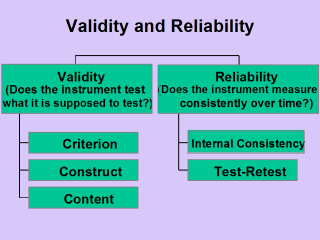| front |1 |2 |3 |4 |5 |6 |7 |8 |9 |10 |11 |12 |13 |14 |15 |16 |17 |18 |19 |20 |21 |review |
 |
Validity and
Reliability are fundamental criteria of a good measure. Validity -- 3 general types of validity will be talked about. Criterion validity refers to how well scores on an instrument compare to some criteria (such as scores on existing instruments or outcome measures) (specific types are concurrent, predictive) Construct validity is a more general type of validity that refers to the degree to which the instrument is a measure the characteristic of interest (specific types are convergent, divergent) Content validity is based on judgments by professionals that the test content is relevant to the characteristic of interest. That is, the items of the instrument are appropriate to assess what needs to be assessed. Reliability -- Internal consistency refers to how individual items on the test relate to each other and to the total score. Test-retest reliability refers to reproducibility of scores when given to the same sample under similar conditions at different points in time. |